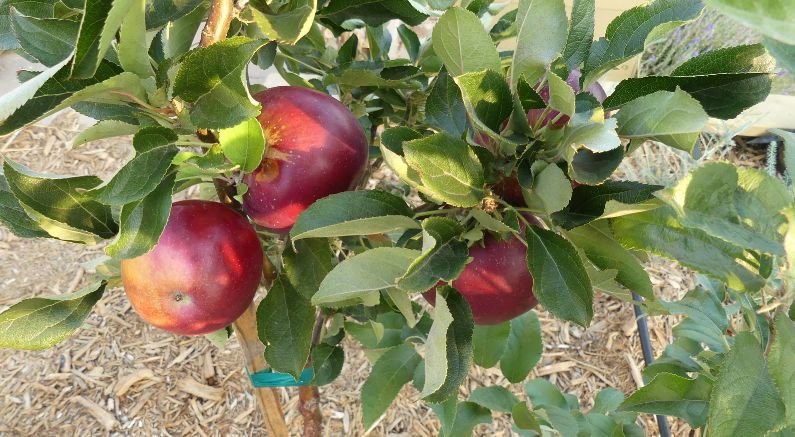Apples are the most popular fruit tree planted in the world with 7,500+ varieties to choose from. This can make selecting just one a challenge. Based on the adaptability alone, the Arkansas Black apple should be on the top of your list.
Thought to have been discovered in the mid-1800's in Bentonville, Arkansas, it is said to be a seedling of the Winesap apple, which it shares many characteristics. It quickly grew to become a popular regional selection and was a commercial success into the 1930’s. The Arkansas Black has distinguished itself as a true Gem of home garden apple selections since that time.
Very able to adapt to many climates, the Arkansas Black can tolerate the hot summer inland valley temperatures of California - sometimes more than 110 degrees - or the cold winter climates that are found in USDA Zone 5a - minus 15 to 20 degrees. Then everything in between including coastal planting zones like 8a and b and zone 10 are all good for the Arkansas Black Apple.
The fruit has a deep rich red to black color that distinguishes it from all other apples. The flavor is a wonderfully unique and sweet taste to which there are few comparisons, often defined as if it were a fine wine.
Arkansas Black has become best known for its ability to be stored for 3 to 4 months and - like a fine wine - it just continues to improve in quality. In fact, the Arkansas Black apple is a difficult apple to eat directly off the tree; it is hard as a rock, almost impossible to bite into and really lacks any flavor to speak of.
When picked and stored in temperatures of 50 degrees or less (such as the refrigerator), the Arkansas Black Apple begins to mellow into one the finest dessert apples known. The hard texture softens to a pleasant crispness, and the flesh comes alive with a unique musky, sweet flavor not found in any other apple. This process of refinement just continues with storage, with each Arkansas Black Apple tasting just a hint better than the last.
Arkansas Black is a highly desirable cider apple, as well as a great cooking and applesauce selection. Of course, it is second to none when fully ripe for fresh eating.
Arkansas Black is an apple that requires a pollinator and is a perfect addition to ones already-established apple collection. If you are just getting started and your desire is to enjoy an Arkansas Black, be sure to include a self-fruitful selection like Golden Delicious or Empire apple as a pollinator. Not only will this ensure a great crop, but it will also extend your apple enjoying season with early selections and the Arkansas Black, which ripens later in the season.
Plant Arkansas Black where it gets a full day of sunlight and always mulch well. Mulching well is particularly important in the hotter, drier climates where Arkansas Black will be protected from getting a sun spot on the sun side of the fruit. Mulching keeps the root cool and helps to avoid premature fruit drop, which is common in hot/dry climates. Mulching is a benefit in all climates as it improves the soil beneath the tree and cuts the amount of water needed throughout the season.
Finally, the Arkansas Black is very disease resistant, which just adds to the value to the home gardener, as most of the common apple diseases will not interfere with successfully growing and cropping this jewel. With the enormous selection of apples one has to choose from, the Arkansas Black is one that should rise to the top of the list of considerations.

